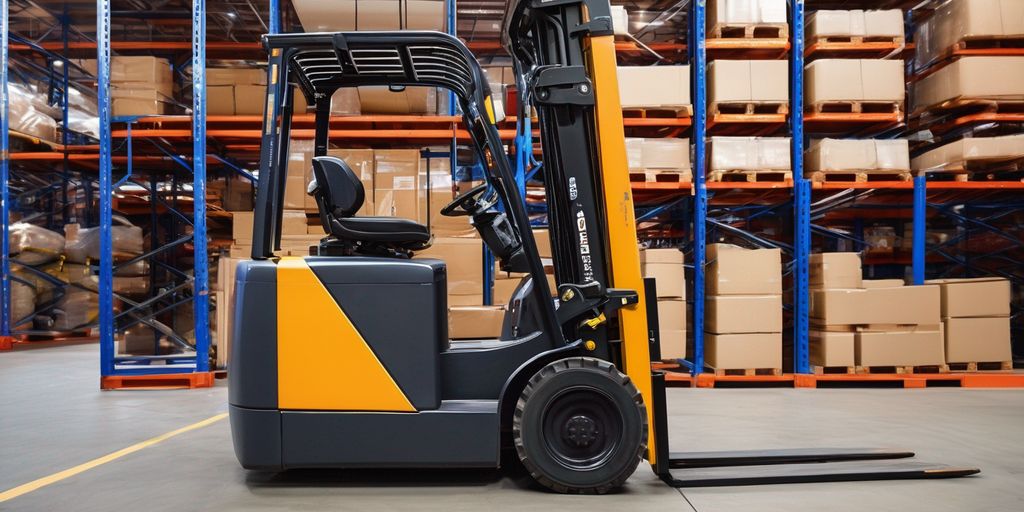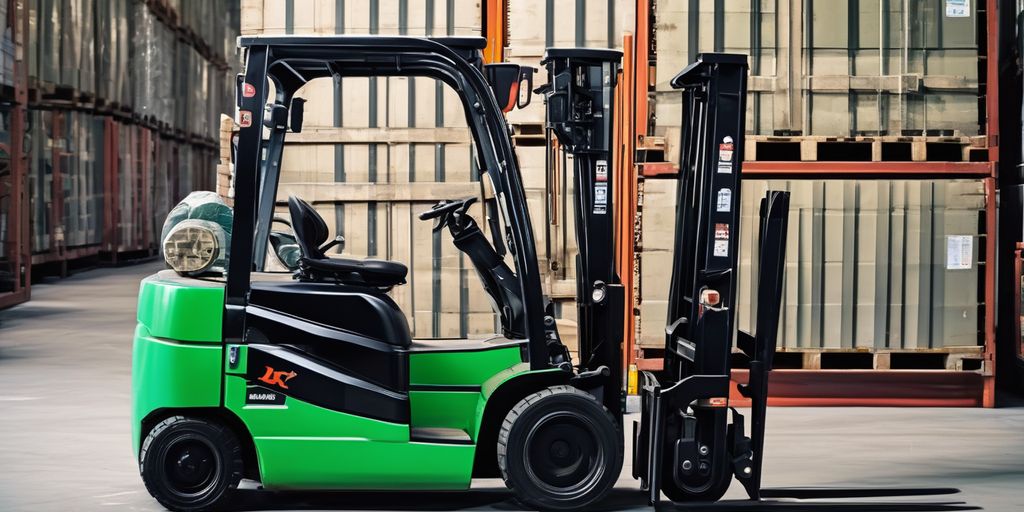Operating a forklift is a critical skill in many industries, from warehousing and logistics to construction and manufacturing. To ensure safety and efficiency, forklift operators must master a range of essential skills. This article outlines the key competencies every forklift operator should develop, covering mechanical knowledge, safe operating practices, effective communication, load management, and more.
Key Takeaways
- Understanding the mechanics of different types of forklifts is fundamental for effective operation and maintenance.
- Safe operating practices, including pre-operation inspections and load handling techniques, are crucial for preventing accidents.
- Effective communication, whether through hand signals or communication devices, ensures smooth coordination with ground personnel.
- Proficiency in load management, including proper weight distribution and securing loads, helps avoid overloading and accidents.
- Navigating confined spaces and adapting to various work environments, such as different terrains and weather conditions, requires specialized skills and awareness.
Understanding Forklift Mechanics
Basic Components
A forklift is composed of several essential parts that work together to perform lifting and transporting tasks. These include the mast, carriage, forks, and hydraulic system. Understanding these components is crucial for effective operation and maintenance.
Common Types of Forklifts
There are various types of forklifts, each designed for specific tasks and environments. Some common types include:
- Counterbalance Forklifts
- Reach Trucks
- Pallet Jacks
- Rough Terrain Forklifts
Knowing the differences between these types helps operators choose the right equipment for the job.
Routine Maintenance
Routine maintenance is vital for the longevity and safety of forklifts. Regular checks should include inspecting the hydraulic system, checking tire pressure, and ensuring all safety features are functional. Proper forklift training emphasizes the importance of these maintenance tasks to prevent accidents and equipment failure.
Regular maintenance not only extends the life of the forklift but also ensures a safer working environment.
Mastering Safe Operating Practices
Pre-Operation Inspections
Before starting any forklift, it's crucial to conduct thorough pre-operation inspections. This includes checking fluid levels, tire conditions, and ensuring all controls are functioning properly. Safety first: best practices for operating a forklift involve identifying any potential issues before they become serious problems.
Load Handling Techniques
Proper load handling is essential for maintaining balance and preventing accidents. Operators should be trained in the correct methods for picking up, transporting, and setting down loads. Key techniques include keeping the load low to the ground and ensuring it is evenly distributed on the forks.
Navigating Different Terrains
Forklift operators often encounter various terrains, from smooth warehouse floors to uneven outdoor surfaces. Adapting to these conditions is vital for safe operation. Operators should adjust their speed and maneuvering techniques based on the terrain to avoid tipping or losing control.
Effective communication is vital for forklift operators, contributing to workplace safety and productivity. Clear and concise communication among team members ensures that everyone is aware of their surroundings and actions, reducing the risk of accidents.
Effective Communication Skills
Hand Signals and Their Meanings
Forklift operation requires not only technical skills but also effective communication. Hand signals are crucial, especially in noisy environments where verbal communication is challenging. Understanding and using these signals correctly can prevent accidents and ensure smooth operations.
Using Communication Devices
In addition to hand signals, communication devices like radios and headsets are essential. These tools help operators stay in constant contact with supervisors and coworkers, enhancing coordination and safety. It's important to ensure that these devices are always in good working condition.
Coordinating with Ground Personnel
Effective communication and coordination are essential for forklift drivers. Operators must communicate clearly with ground personnel to ensure everyone's safety. This includes signaling when moving loads, stopping, or changing directions. Regular training sessions can help improve these communication skills and reduce the risk of accidents.
Proficiency in Load Management
Weight Distribution Principles
Understanding the principles of weight distribution is crucial for any forklift operator. Proper load balancing ensures that the forklift remains stable and prevents accidents. Operators must be trained to recognize how different weights and placements affect the forklift's center of gravity.
Securing Loads Properly
Securing loads correctly is essential to prevent shifting or falling during transport. Operators should use appropriate securing methods such as straps or chains and ensure that the load is evenly distributed. This practice not only enhances safety but also protects the goods being transported.
Avoiding Overloading
Overloading a forklift can lead to severe accidents and damage to both the forklift and the load. Operators must be aware of the forklift's load capacity and adhere to it strictly. Regular competency assessments can help in maintaining high standards of safety and operational efficiency.
Ensuring that loads are managed properly is the ultimate guide to choosing the right fork truck forks for your warehouse. The importance of load balancing, operator training, and safety features cannot be overstated for efficient and safe operations.
Navigating in Confined Spaces
Operating a forklift in confined spaces requires a high level of skill and attention to detail. Precision and control are paramount to ensure safety and efficiency in such environments. Forklift operators must be adept at maneuvering their equipment in tight areas without causing damage or accidents.
Maneuvering Techniques
Mastering the art of maneuvering in confined spaces involves understanding the forklift's turning radius and utilizing techniques such as three-point turns. Operators should practice these techniques regularly to maintain their proficiency.
Awareness of Surroundings
Being constantly aware of the surroundings is crucial when operating in tight spaces. Operators should ensure the area is free of obstructions and that bystanders are aware of their movements. This is especially important in confined environments where visibility may be limited.
Utilizing Mirrors and Cameras
Modern forklifts are often equipped with mirrors and cameras to aid in navigation. These tools can significantly enhance an operator's ability to see around the forklift and avoid potential hazards. Regularly checking these devices and ensuring they are clean and functional is a best practice.
Emergency Response Preparedness
Recognizing Potential Hazards
Identifying potential hazards is crucial for any forklift operator. Being aware of your surroundings and understanding the risks associated with different environments can prevent accidents and ensure a safer workplace.
Executing Emergency Protocols
In the event of an emergency, knowing the correct protocols can save lives. Operators should be trained in emergency procedures, including evacuation routes and shutdown processes. Regular drills can help reinforce these protocols and ensure everyone is prepared.
First Aid and Safety Equipment
Having access to first aid and safety equipment is essential. Forklift operators should know the location of first aid kits, fire extinguishers, and other safety tools. Additionally, they should be trained in basic first aid to provide immediate assistance if needed.
Regular training and emergency preparedness enhance workplace safety, reduces accidents, and ensures compliance with OSHA regulations.
Adapting to Different Work Environments

Indoor vs. Outdoor Operations
Operating a forklift indoors differs significantly from outdoor operations. Indoor environments often have tighter spaces and more obstacles, requiring precise maneuvering. Conversely, outdoor operations may involve uneven terrain and varying weather conditions, demanding robust handling skills.
Handling Extreme Weather Conditions
Forklift operators must be prepared to handle extreme weather conditions. This includes understanding how to operate machinery in rain, snow, or extreme heat. Proper maintenance and the use of specialized equipment can help ensure safety and efficiency in these conditions.
Adjusting to Various Floor Surfaces
Different work environments come with various floor surfaces, from smooth concrete to gravel or dirt. Operators need to adjust their driving techniques accordingly to maintain stability and control. Regular inspections and routine maintenance of the forklift can help in adapting to these diverse surfaces.
Adapting to different work environments is crucial for maximizing workplace safety and efficiency. Specialized training programs can help operators become proficient in handling various conditions, ensuring both safety and productivity.
Conclusion
Mastering the essential skills of forklift operation is crucial for ensuring safety, efficiency, and productivity in any warehouse or industrial setting. From understanding the mechanics of the forklift to honing precise maneuvering techniques, each skill plays a vital role in the daily tasks of a forklift operator. Continuous training and adherence to safety protocols not only protect the operator but also contribute to a safer work environment for everyone. By focusing on these core competencies, forklift operators can significantly enhance their performance and contribute to the overall success of their organization.
Frequently Asked Questions
What are the basic components of a forklift?
The basic components of a forklift include the mast, carriage, forks, counterweight, power source, and operator's cab.
How often should routine maintenance be performed on a forklift?
Routine maintenance should be performed according to the manufacturer's recommendations, typically every 200-250 hours of operation.
What are the key safety checks during pre-operation inspections?
Key safety checks during pre-operation inspections include checking fluid levels, tire condition, fork integrity, and ensuring all controls are functioning properly.
How can I improve my load handling techniques?
To improve load handling techniques, practice proper load balancing, use appropriate lifting methods, and ensure the load is secure before moving.
What is the best way to navigate a forklift in confined spaces?
The best way to navigate a forklift in confined spaces is to use slow and precise movements, constantly monitor your surroundings, and utilize mirrors and cameras for better visibility.
What should I do in case of a forklift emergency?
In case of a forklift emergency, follow the established emergency protocols, use safety equipment, and if necessary, administer first aid until professional help arrives.




Leave a comment
This site is protected by hCaptcha and the hCaptcha Privacy Policy and Terms of Service apply.